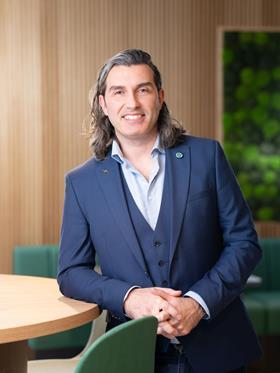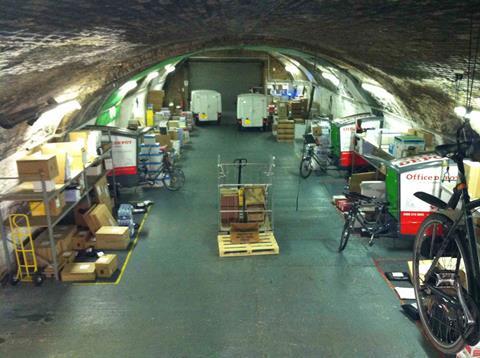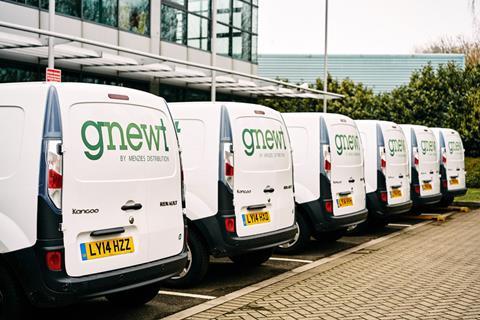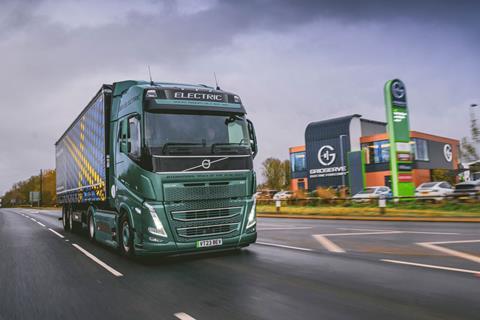MT’s 2024 top Decarbonisation Power Player on a mission to decarbonise road freight transport
The founder of Gnewt Cargo and now at GRIDSERVE, he is said to be "tackling the perennial 'chicken and egg' conundrum of which comes first, vehicles or charging infrastructure". Our judges added: "Sam has been very prominent across the board. He is vocal, influential and passionate about decarbonising the road transport sector and is leading one of the government's four flagship ZEHID programmes, Electric Freightway."
Clarke describes himself as "a life-long entrepreneur, industry advisor, EV owner, operator and driver for over 20 years". Clarke, alongside two co-drivers, still hold the Guinness World Record for the longest distance ever driven in an electric van on a single charge (500kms) and is actively preparing for future attempts to help showcase the art of the possible with electric vehicles.
 Currently chief vehicle officer at EV charging firm GRIDSERVE, he is still probably best known in the logistics industry as the founder of the final-mile delivery operator Gnewt Cargo in 2009.
Currently chief vehicle officer at EV charging firm GRIDSERVE, he is still probably best known in the logistics industry as the founder of the final-mile delivery operator Gnewt Cargo in 2009.
He successfully created the UK's largest all electric zero-emission logistics fleet with the largest V2G [vehicle to grid] network and largest commercial smart charging infrastructure, before selling the business to John Menzies in 2017. With disarming honesty, he admits the idea for Gnewt arose from a previous business failure. "My first EV-related business was importing electric motorbikes and scooters back in 2002," he says. "I saw an opportunity when I spent a lot of time in China and noticed two-wheel EVs buzzing around.
I thought 'this is it, this is the future'. "I helped design, develop and engineer a product that we then began importing into the UK. "But in 2002, I was far too early to market, and whilst we sold all the products we imported, it was not commercially viable to continue long-term, hence the failure. "Fail as it did, I learnt a lot about running a start-up business and how EVs worked.
So we embarked on turning that experience, not into selling EVs but into a service model. That is how the last-mile logistics element came into being. With a new business partner and new angel investors, we turned the concept into the leading environmental logistics company and fastest growing enterprises in the UK."
While Clarke had no experience of logistics at the time, he saw final-mile deliveries as a suitable application for EVs, alongside a healthy dose of determination in a highly nascent market. He also admits that in the early days he was far more interested in making money than saving the planet, but 20 years on and with two young children, the environmental benefits of EVs have grown to become his main motivator. "I want to leave a legacy of having contributed positively to the planet," he says. "That desire became stronger as time moved on."
The name Gnewt (the G is silent) came about because Clarke and his business partner called the company Gecko and already had the 'G' logo designed with little gecko hands on it. But having subsequently discovered trademark conflicts with a German e-bike builder, had to creatively and hastily change the name. So Gnewt was born - "it handily became an acronym for 'green new transport' but at the time it simply meant we saved money on a logo redesign!"
As with all the best logistics success stories, Gnewt started under a "railway arch near Tower Bridge with many rats for company" and its first customer for what was then the totally new concept of all-electric deliveries was Office Depot. "They were at that time the largest stationery company in the world and had already expressed interest in trying to deliver environmentally via TfL," says Clarke. "As part of our research into a potential business proposition we also spoke with TfL and that's where the introductions began. "It was a meeting of minds really and we managed to pull it all together.
We were lucky enough to secure a commitment from them before we even opened the doors for business. So we started under a single dusty railway arch, with a truck arriving every night at 2am, pallets all over the floor, and pedal-assisted electric cargocycles for delivery wagons."
 In the next eight years, before Gnewt was acquired by John Menzies in 2017, the business underwent changes in investors and grew rapidly. "Our angels exited and DX replaced them as our strategic investor," says Clarke. "By the end of my tenure we had over 100 electric vans on the fleet and employed more than 100 people.
In the next eight years, before Gnewt was acquired by John Menzies in 2017, the business underwent changes in investors and grew rapidly. "Our angels exited and DX replaced them as our strategic investor," says Clarke. "By the end of my tenure we had over 100 electric vans on the fleet and employed more than 100 people.
In my 10 years there, eight as owner and two years exiting, we delivered over 10 million parcels. "It remains I believe the largest 100% electric logistics fleet there has ever been in the UK. The likes of DPD have dwarfed our efforts now with thousands of EVs but at the time we reshaped and expedited how people delivered in urban areas not just by introducing EVs, but doing it profitably and successfully for many years.
That was pretty cool." After the cargocycles, Gnewt needed longer distances and greater capacity so moved onto electric quadricycles before graduating to "proper vans" with the Renault Kangoo ZEV and Nissan ENV200 that only came to market several years after the business had already opened. Some things never change, and the main issue Clarke faced as his electric fleet grew was charging capacity.
He can also claim to have invented "the dumbest smart charging solution going", though here too things have moved on a lot since. "All charging was done at our depots which was complicated," he says. "In the end one of our depots had around 80 vehicles with enough supply to charge around 40 or 50. They couldn't all be drawing energy at the same time as it would just blow the fuses.
"To make it work we ended up with strings of 70 or 80 three-pin sockets on every wall with mechanical timers clicking on and off at different times to ensure that all vans could charge overnight in the dwell time we had available and within the limitations of the local grid supply. We then had to screw boxes over all the plugs to stop the drivers fiddling with the timers! "Nowadays of course the same thing happens, except smart enabled chargers, vehicle remote connections and local grid systems all combine with clever cloud-based algorithms to do the same thing but in a far more efficient (and safe) way.
We pioneered this approach during the Menzies era with smart depots and chargers and fleet management software provided by EO charging." But all of these solution-focused activities did not address public charging limitations for commercial fleets such as Clarke's. "I was once interviewed by the mayor of London Sadiq Khan and he asked me 'where do you charge your vehicles on our roads?'" says Clarke. "I said 'I don't, mayor, because charging is too expensive, they are not in the right places, they don't fit commercial vehicles and I can't rely on them when I need 99.9% uptime in operational capacity'." When Clarke was exiting Gnewt he was contemplating what to do next and happened to be doing a presentation at an event in London on the challenges of public charging of EVs.
"The CEO of GRIDSERVE Toddington Harper was in the audience; someone I've known for 20 years but had lost contact with as our businesses went in different environmental-based directions," he says. "Toddington tapped me on the shoulder during the event's lunch break and said he was trying to sort out all the things I'd been talking about on stage. "I felt it was the next thing that needed to be fixed in this industry and was inspired by Toddington's ambitions and couldn't wait to get started, this time in a supporting role but with no less passion to get thing done. GRIDSERVE has been a phenomenal success and it has been a privilege to be a small part of that."
In 2020, Clarke was appointed chief vehicle officer at GRIDSERVE, with a remit to drive forward mass uptake of electric vehicles through the creation of a net-zero EV leasing division; support commercial charging infrastructure build-outs and the roll out of high-powered electric forecourts; and upgrade the GRIDSERVE Electric Highway network that is already on 85% of UK service stations. GRIDSERVE's mission is to span the vehicle size range from bikes and cars to top weight HGVs as well as deliver sustainable energy and move the needle on climate change.
 "It started with B2C cars because they are the largest volumes of EVs out there," Clarke says. "From a standing start just a few short years ago, we now charge around 200,000 people a month across the UK which is one of the busiest networks in the world.
"It started with B2C cars because they are the largest volumes of EVs out there," Clarke says. "From a standing start just a few short years ago, we now charge around 200,000 people a month across the UK which is one of the busiest networks in the world.
We are trying to widen that now to commercial vehicles and that is where my logistics background comes to the fore. "I have always enjoyed being a pioneer and attempting to be the catalyst for change before others. I doubt I'll ever stop.
It's not an easy existence and takes its toll sometimes, but it's worth it selfishly for the good of my children and more widely for a planet we are irreversibly and rapidly destroying." In 2023 Clarke led the successful bid for GBP63m of government funding from the DfT under Innovate UK's 'Zero emission HGV and infrastructure demonstrator' programme (ZEHID), the second largest award ever made by Innovate UK to private enterprise. GRIDSERVE is leading the seven-year Electric Freightway project with principal partner Hitachi, which aims to "lay the foundations for a nationwide charging network dedicated to electric HGVs".
It is looking at breaking down barriers to both on-the-road and at-depot charging and involves a 33-strong consortium with some of the largest hauliers and logistics operators in the world. "It is the start of changing a whole industry which is a big statement," says Clarke. "But if we can put up to 140 eHGVs on the road in the next two years that will be 8% of all eHGVs on the road by that time. That will hopefully give the wider industry confidence to follow.
This isn't a trial, it's new beginning and will materially address the 20% of transport emissions that come from just the 4% of all the vehicles on the road that HGVs currently represent." While electrifying smaller trucks on shorter routes will be the low hanging fruit, ZEHID aims to show that zero-emission vehicles are practical propositions for heavy, long-distance HGVs too. "The goal is to show it works for the heaviest loads from Lands' End to John o' Groats," Clarke says. "That's the end game, but it will start with a combination of back-to-base and opportunity charging at GRIDSERVE public sites.
Then we have to push the envelope and encourage the consortium to spread its wings once they get comfortable. "There is no reason we cannot do both at the same time. The infrastructure we are building for the 44-tonne trucks is completely compatible with eHGVs of all sizes.
We need to focus on electrifying everything to stop the emissions from transport." While smart charging can make the most of a transport depot's often limited incoming power supply, rapid charging of a fleet of eHGVs is usually going to require some upgrade to the electricity connection. Operators contemplating a move to eHGVs cite the eye-wateringly high cost and long lead times for their local distribution network operator (DNO) to carry out the work as one of the biggest barriers to going electric.
"We need more support to get those more powerful grid connections and at more affordable costs," says Clarke. "One of the reasons we were so successful in the ZEHID bid was the scale of the foundations we already have in the motorway service areas. "We have demonstrated we can do this in the car world and it's not a tremendous leap to the eHGV sector. We are hoping to build around 14 public sites during the project and already have 20-plus in the pipeline.
"Some of those sites will fall away because they won't be feasible in the timeframe. Putting eHGV charging on every MSA in the UK is some way away and that will need some help." Clarke says other possible solutions to the problem of a lack of electrical power exist however.
"There are other innovative ways with local solar generation and battery storage which we already do at some service areas," Clarke says. "Cornwall services is an example. We don't have the accessible grid capacity we'd like and it is too costly and too far in the future to secure it in the timeframe we need. But with local generation and local storage we can distribute the energy when called upon and trickle charge the batteries back up the rest of the time."

As a long-term proponent of battery electric technology, it is no surprise to find Clarke firmly in the anti-hydrogen camp when it comes to fuelling road vehicles. "GRIDSERVE is a technology agnostic company but there are so many reasons why hydrogen won't work," he asserts. "Battery electric is the only show in town and hydrogen is in no way demonstrating its capabilities. It is highly inefficient and costly to produce, there is nowhere near sufficient infrastructure or even a growth roadmap that comes close to demonstrating the required scale and there are no vehicles available to a prove cost-effectiveness on a total cost of ownership model.
It's a dead end. "I believe this technology will only likely be suited to trains, marine and aerospace, if at all. And even then, the climate crisis needs dealing with today.
The planet cannot wait in hope of this technology potentially reaching maturity over the next two decades, by then it's far too late. Battery electric vehicles are proven to work today, and so that's where we should all be focusing our efforts." The timeframes for decarbonising road transport give many operators cause for concern and Clarke shares them.
The deadlines for bans on sales of new non-zero emission trucks (2035 for under 26 tonnes and 2040 for all HGVs) are alarmingly close and there are plenty of voices arguing that they are totally unrealistic and will have to be delayed. "Part of the ZEHID project is to help ensure we are ready for those dates," he says. "It won't be easy to achieve, but we must all do everything in our power to make it happen. As the first generation to truly recognise the climate crisis and the last generation to be able to do anything about it, it is all our responsibilities to deliver a material difference and move the needle on climate change.
And we will."